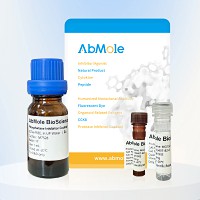All AbMole products are for research use only, cannot be used for human consumption.

Species: Human
Expression system: E.coli
Purity: > 95% as determined by reduced SDS-PAGE
Endotoxin: less than 0.1 ng/ug (1 EU/ug) as tested by LAL
Storage and stability: Lyophilized proteins should be stored at < -20°C but can be stored at room temperature for up to 3 weeks. The recombinant protein solution can be stored at 4-7℃ for 2-7 days. The isometric solution of the recombinant sample was stable at < -20°C for 3 months.
Bioactivity: Tumor necrosis factor ligand superfamily member 9(4-1BBL) is a unipassable type II membrane protein, a member of the tumor necrosis factor family. 4-1BBL is a 254-amino acid cytokine expressed in the brain, placenta, lung, skeletal muscle and kidney. TNFSF9 has been shown to reactivate incompetent T lymphocytes in addition to promoting T cell proliferation. This cytokine may play a role in the activation of induced cell death (AICD) and homologous interactions between T cells and B cells/macrophages. It has also been shown to be essential for optimal CD8 responses in CD8 T cells and is thought to be involved in T-cell - tumor cell interactions.
| Solubility (25°C) | It is not recommended to reconstitute to a concentration less than 100 μg/ml. |
| Storage |
Powder -20°C 3 years ; 4°C 2 years In solvent -80°C 6 months ; -20°C 1 month |
| Related Cytokines and Growth Factors Products |
|---|
| Recombinant Human GDF-15 Protein (HEK293 N-hFc)
Growth-differentiation factor 15 (GDF15), also known as MIC-1, is a secreted member of the transforming growth factor (TGF)-β superfamily. GDF-15 has a role in regulating inflammatory and apoptotic pathways in injured tissues and during disease processes. GDF-15 overexpression arising from an expanded erythroid compartment contributes to iron overload in thalassemia syndromes by inhibiting hepcidin expression. |
| Recombinant Human FGFR1 Protein (HEK293, C-His)
FGFR1, also known as CD331, is a full-length representative protein consists of an extracellular region, composed of three immunoglobulin-like domains, a single hydrophobic membrane-spanning segment and a cytoplasmic tyrosine kinase domain. |
| Recombinant Human FGFR2 Protein (HEK293, C-His)
FGFR2, also known as CD332, acts as cell-surface receptor for fibroblast growth factors and plays an essential role in the regulation of cell proliferation, differentiation, migration and apoptosis, and in the regulation of embryonic development. FGFR2 plays an essential role in the regulation of osteoblast differentiation, proliferation and apoptosis, and is required for normal skeleton development. It also promotes cell proliferation in keratinocytes and imature osteoblasts, but promotes apoptosis in differentiated osteoblasts. |
| Recombinant Mouse BMP-4 Protein (E. coli, C-His)
Bone Morphogenetic Protein-4 (BMP-4) is a critical signaling molecule required for the early differentiation of the embryo and establishing of a dorsal-ventral axis. BMP-4 is secreted from the dorsal portion of the notochord, and it acts in concert with sonic hedgehog to establish a dorsal-ventral axis for the differentiation of later structures. |
| Recombinant Human Coagulation Factor X (HEK293, C-Fc)
Coagulation factor X, belongs to the peptidase S1 family. Coagulation factor X is initially synthesized in the liver. Coagulation factor X is a vitamin K-dependent glycoprotein that converts prothrombin to thrombin in the presence of factor Va, calcium and phospholipid during blood clotting. |
All AbMole products are for research use only, cannot be used for human consumption or veterinary use. We do not provide products or services to individuals. Please comply with the intended use and do not use AbMole products for any other purpose.


Products are for research use only. Not for human use. We do not sell to patients.
© Copyright 2010-2024 AbMole BioScience. All Rights Reserved.
